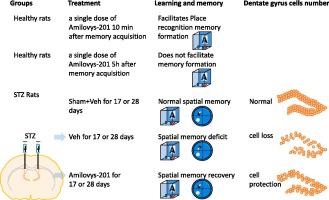当前位置:
X-MOL 学术
›
Brain Res.
›
论文详情
Our official English website, www.x-mol.net, welcomes your feedback! (Note: you will need to create a separate account there.)
Amylovis-201 enhances physiological memory formation and rescues memory and hippocampal cell loss in a streptozotocin-induced Alzheimer's disease animal model
Brain Research ( IF 2.9 ) Pub Date : 2024-03-02 , DOI: 10.1016/j.brainres.2024.148848 Daymara Mercerón-Martínez , Laura Alacán Ricardo , Arturo Bejerano Pina , Norma Orama Rojo , Ariel Expósito Seco , Yamilé Vega Hurtado , Bárbara Estupiñán Días , Isabel Fernández , Laura García Pupo , Marquiza Sablón Carrazana , Chryslaine Rodríguez-Tanty , Roberto Menéndez Soto del Valle , William Almaguer-Melian
Brain Research ( IF 2.9 ) Pub Date : 2024-03-02 , DOI: 10.1016/j.brainres.2024.148848 Daymara Mercerón-Martínez , Laura Alacán Ricardo , Arturo Bejerano Pina , Norma Orama Rojo , Ariel Expósito Seco , Yamilé Vega Hurtado , Bárbara Estupiñán Días , Isabel Fernández , Laura García Pupo , Marquiza Sablón Carrazana , Chryslaine Rodríguez-Tanty , Roberto Menéndez Soto del Valle , William Almaguer-Melian

|
Alzheimer's disease is the most common neurodegenerative disease, and its treatment is lacking. In this work, we tested Amylovis-201, a naphthalene-derived compound, as a possible therapeutic candidate for the treatment of AD. For this purpose, we performed three experiments. In the first and third experiment, animals received a bilateral administration of streptozotocin and, starting 24 h after injection, a daily dose of Amylovis-201 (orally), for 17 days or for the whole time of the experiment respectively (28 days), after which learning and memory, as well as the number of hippocampal dentate gyrus cells, were assessed. In the second experiment, healthy animals received a single dose of Amylovis-201, 10 min or 5 h after the learning section to assess whether this substance could promote specific mechanisms involved in memory trace formation. Our data show that, administration of a single dose of Amylovis-201, 10 min after the end of training, but not at 5 h, produces a prolongation in memory duration, probably because it modulates specific mechanisms involved in memory trace consolidation. Furthermore, daily administration of Amylovis-201 to animals with bilateral intracerebroventricular injection of STZ produces a reduction in the loss of the hippocampus dentate gyrus cells and an improvement in spatial memory, probably because Amylovis-201 can interact with some of the protein kinases of the insulin signaling cascade, also involved in neural plasticity, and thereby halt or reverse some of the effects of STZ. Taking to account these results, Amylovis-201 is a good candidate for the therapeutic treatment of AD.
中文翻译:

Amylovis-201 增强链脲佐菌素诱导的阿尔茨海默病动物模型中的生理记忆形成并挽救记忆和海马细胞损失
阿尔茨海默病是最常见的神经退行性疾病,目前尚缺乏治疗方法。在这项工作中,我们测试了 Amylovis-201(一种萘衍生化合物)作为治疗 AD 的可能候选药物。为此,我们进行了三个实验。在第一个和第三个实验中,动物接受双侧链脲佐菌素给药,并在注射后 24 小时开始每日服用 Amylovis-201(口服),分别持续 17 天或整个实验时间(28 天),之后评估学习和记忆以及海马齿状回细胞的数量。在第二个实验中,健康动物在学习部分后 10 分钟或 5 小时接受单剂量的 Amylovis-201,以评估该物质是否可以促进参与记忆痕迹形成的特定机制。我们的数据表明,在训练结束后 10 分钟(而非 5 小时)施用单剂量 Amylovis-201 会延长记忆持续时间,可能是因为它调节了记忆痕迹巩固中涉及的特定机制。此外,每天对双侧侧脑室内注射 STZ 的动物施用 Amylovis-201 可减少海马齿状回细胞的损失并改善空间记忆,这可能是因为 Amylovis-201 可以与海马齿状回细胞的某些蛋白激酶相互作用。胰岛素信号级联反应也参与神经可塑性,从而阻止或逆转 STZ 的一些作用。考虑到这些结果,Amylovis-201 是治疗 AD 的良好候选者。
更新日期:2024-03-02
中文翻译:

Amylovis-201 增强链脲佐菌素诱导的阿尔茨海默病动物模型中的生理记忆形成并挽救记忆和海马细胞损失
阿尔茨海默病是最常见的神经退行性疾病,目前尚缺乏治疗方法。在这项工作中,我们测试了 Amylovis-201(一种萘衍生化合物)作为治疗 AD 的可能候选药物。为此,我们进行了三个实验。在第一个和第三个实验中,动物接受双侧链脲佐菌素给药,并在注射后 24 小时开始每日服用 Amylovis-201(口服),分别持续 17 天或整个实验时间(28 天),之后评估学习和记忆以及海马齿状回细胞的数量。在第二个实验中,健康动物在学习部分后 10 分钟或 5 小时接受单剂量的 Amylovis-201,以评估该物质是否可以促进参与记忆痕迹形成的特定机制。我们的数据表明,在训练结束后 10 分钟(而非 5 小时)施用单剂量 Amylovis-201 会延长记忆持续时间,可能是因为它调节了记忆痕迹巩固中涉及的特定机制。此外,每天对双侧侧脑室内注射 STZ 的动物施用 Amylovis-201 可减少海马齿状回细胞的损失并改善空间记忆,这可能是因为 Amylovis-201 可以与海马齿状回细胞的某些蛋白激酶相互作用。胰岛素信号级联反应也参与神经可塑性,从而阻止或逆转 STZ 的一些作用。考虑到这些结果,Amylovis-201 是治疗 AD 的良好候选者。



























 京公网安备 11010802027423号
京公网安备 11010802027423号